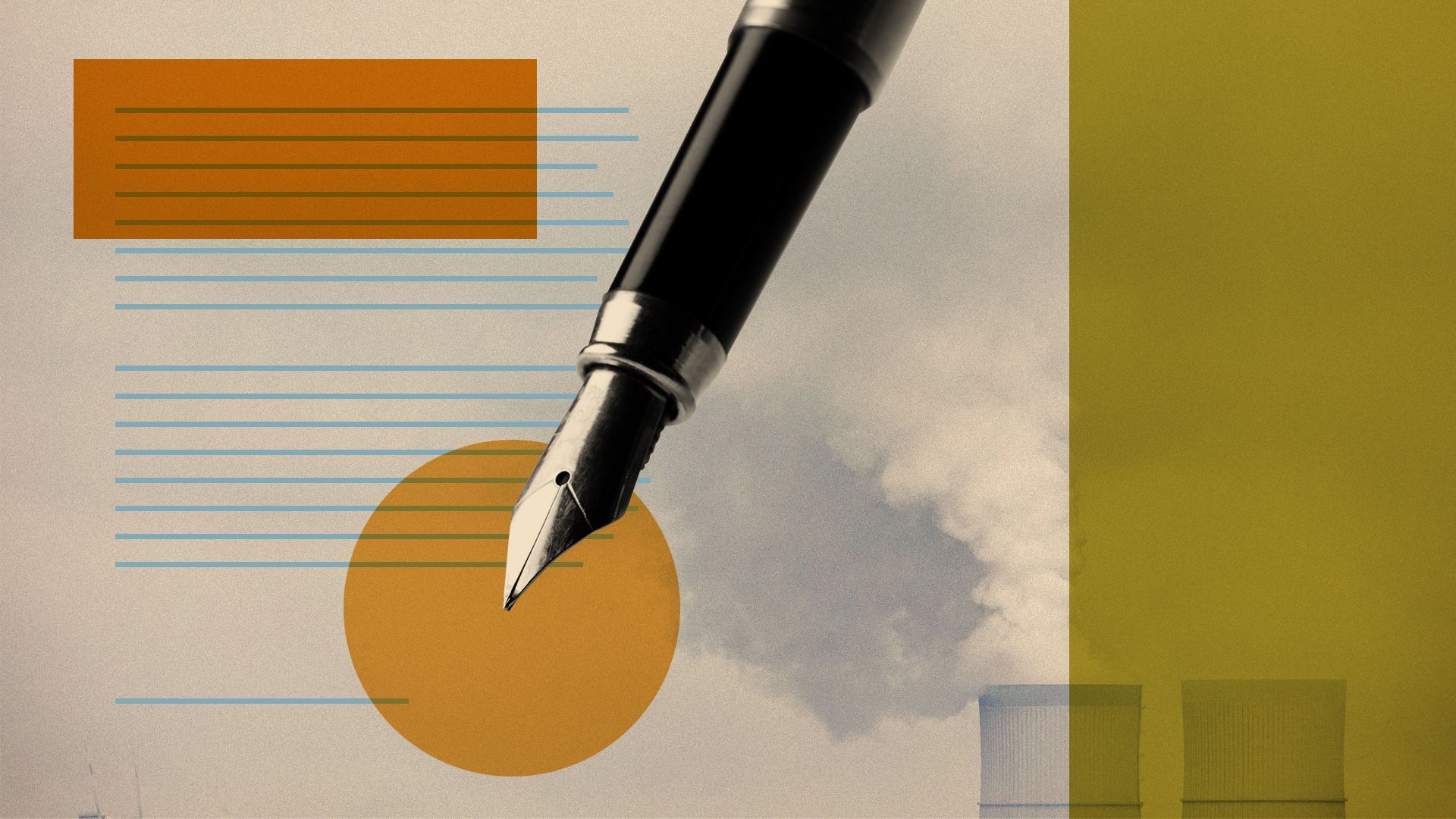COP26 climate deal calls for historic shift from fossil fuels

- Andrew Freedman, author ofAxios Generate

Photo illustration: Brendan Lynch/Axios. Photo: Florian Gaertner/Getty Images
GLASGOW, Scotland — International negotiators approved a climate agreement at the COP26 summit Saturday that calls for reductions in coal and fossil fuel use and transition to renewables — a first in the more than 25-year history of UN climate talks.
- However, the talks fell short of meeting developing countries' demands for access to funding to compensate them for climate-related losses.
- The fossil fuel language was weakened via the intervention from India just moments before the summit closed Saturday, moving from calling for a "phase out" to a "phase down" of coal.
Why it matters: COP26's aim has been to set the stage for cutting global greenhouse gas emissions steeply enough to limit warming to the Paris Agreement's target of 1.5°C above preindustrial levels. Emissions are currently increasing, and need to be cut by nearly half by 2030 to be consistent with the 1.5-degree goal.
- If warming goes beyond 1.5°, some of the most dangerous climate change impacts would be more likely to occur, according to climate science reports.
- They include the loss of large portions of the world's ice sheets, more damaging extreme weather and heat waves so severe they could make some regions unlivable for part of the year.
Between the lines: The agreement, known as the Glasgow Climate Pact, is a mixed bag for those hoping for a far-reaching, ambitious outcome.
- They did win some victories. The term "fossil fuels" had never appeared in a final COP text before this, despite being the main cause of human-induced climate change.
- The provision that "calls upon" countries to move toward low emission sources of energy, "including escalating effort to phase down unabated coal power and phase out inefficient fossil fuel subsidies," is a win for the countries and activists that wanted a signal that the fossil fuel era is waning.
- In addition, the agreement paves the way for more stringent emissions cuts in the 2020s. It calls for countries to bring their emissions targets in line with what would be needed to hold warming to 1.5°C by the end of 2022, rather than revisiting them in 2025.
Yes, but: The developing nations that are suffering the most severe climate-related damage are walking away without any guarantees that they'll be compensated by the industrialized nations causing most of the damage.
- The agreement calls for wealthy countries to "at least double" their financing for adaptation efforts in the developing world from $100 billion per year (an amount not yet reached) beginning in 2025.
- Yet developing countries ranging from small island nations to Africa met stiff resistance from the U.S. and EU to any specific promises of compensation for their losses.
- A proposal to create a "facility" to oversee loss and damage did not appear in the final text despite having wide support from developing nations.
- The agreement instead calls for a "dialogue" to discuss arrangements for funding, with the understanding that such a dialogue will lead to actual financing in the future.
What they're saying: Still, even negotiators who criticized the lack of firm promises backed the overall agreement. Tuvalu climate envoy Seve Paeniu gave a strong endorsement of the Glasgow text during a negotiating session Saturday afternoon local time.
- “Glasgow has delivered a strong message of hope,” he said.
- Holding his phone in the air to display a picture of his grandchildren, he said: “I will now be able to tell them that Glasgow has made a promise to secure them their future.”
- "We have much work to do, but it does represent real progress," said Marshall Islands' climate envoy Tina Stege, who had advocated for stronger language on loss and damage.
- Both Stege and Paeniu represent small island nations that are especially vulnerable to sea level rise.
The big picture: Like most recent climate summits, COP26 stretched into overtime, with negotiators and journalists nodding off in hallways as talks stretched late into the night for much of this week.
- COP26 brought more than 100 world leaders to Scotland during a year of devastating global climate disasters, and tens of thousands of young people marched in Glasgow and around the world during the summit to demand a strong agreement.